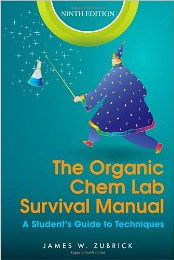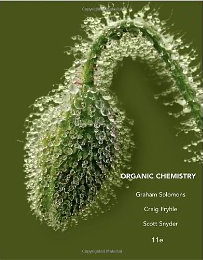

1. Organic Chemistry, 11th ed., Graham Solomons & Craig Fryhle
2. The Organic Chem Lab Survival Manual, 9th ed., Zubrick
(Recommended) Study Guide to Organic Chemistry, 11th ed., Solomons & Fryhle
|
Irvin J. Levy, irv.levy@gordon.edu Professor of Chemistry Katy van Kirk, katy.vankirk@gordon.edu Asst. Professor of Chemistry M-Th, 6:00pm-10:00pm |
There is excitement, adventure and challenge and there
can be great art in organic synthesis. - R.B. Woodward |
TEXTS


1. Organic Chemistry, 11th ed., Graham Solomons & Craig Fryhle
2. The Organic Chem Lab Survival Manual, 9th ed., Zubrick
(Recommended) Study Guide to Organic Chemistry, 11th ed., Solomons & Fryhle
ADDITIONAL MATERIALS
1. Bound notebook for laboratory
2. Safety goggles as required by Department
3. Protective gloves
(Recommended) Darling Flexible Stereochemical Models
COURSE STRUCTURE
Daily effort through reading and problem solving is essential to success in this course. Specific assignments following the enclosed Class Schedule will be given daily. It is expected that the assignment will be completed before the next lecture. Homework will not be collected; however, in order to provide continuing motivation, each lecture will begin with a brief quiz based upon the previous assignment. Self-evaluation of homework will be possible through the use of the Study Guide.
CRITERIA FOR EVALUATION
Two Opportunities will be offered on the dates listed in the enclosed Class Schedule. Make-up opportunities are not available. Two low quiz scores will be dropped when computing the final quiz grade. Make-up quizzes are not available.
Laboratories during the first semester focus on development of techniques commonly used in the organic chemistry laboratory. Through these experiences we will learn to perform organic chemical reactions as well as some organic laboratory operations, such as use of ground glass chemical apparatus, melting point determination, recrystallization, vacuum filtration, distillation (several types), extraction, drying, evaporation, and gas chromatography.
Laboratory grading is partially subjective; you will be evaluated on your general preparedness and effort.
Additionally, during the last laboratory session, a laboratory exam will be administered. Details will be provided
in the laboratory syllabus on the first evening of lab. The lab grade will be determined as follows:
33% - Professor's evaluation
33% - Pre-laboratory quiz
33% - Laboratory examination
Overall grades will be computed as follows:
40% - Opportunity #1 and #2
35% - Quizzes (drop 2 low scores)
25% - Laboratory
Both lecture and laboratory must have passing grades in order for a passing grade in the course.
Please note: The summer course in organic chemistry is an accelerated class which covers the
same material as the normal fall/spring curriculum. Between lecture, laboratory, reading and homework problems
you should plan to spend about 20 hours per week working on this class. Past experience shows that students
who have large time commitments outside this class often perform very poorly. If you are not able to make this
significant time commitment your final result is likely to be very poor. Please make time to allow for success.
Note: The syllabus for laboratory will be distributed during the first laboratory session. Come equipped with lab notebook, goggles and proper laboratory attire.
Date Reading assignment Topic
May 19 1.1-7,9-18 Syllabus and Introduction
Carbon Compounds and Chemical Bonds
Textbook practice problems:
1.2, 1.3, 1.5, 1.6, 1.7,
1.11, 1.14, 1.15, 1.28,
1.32, 1.35abcdefg, and
online problems (solutions for online problems here)
LAB, May 20 LAB - See lab syllabus |
LAB - 8:00 - 10:00 PM - See lab syllabus
|
LAB, May 28 LAB - See lab syllabus |
LAB, June 3 LAB - See lab syllabus |
LAB, June 5 LAB - See lab syllabus
|
LAB, June 10 LAB - See lab syllabus |
LAB, June 12 LAB - See lab syllabus
|
LAB, June 18 LAB - See lab syllabus
Lab checkout
Laboratory examination
|